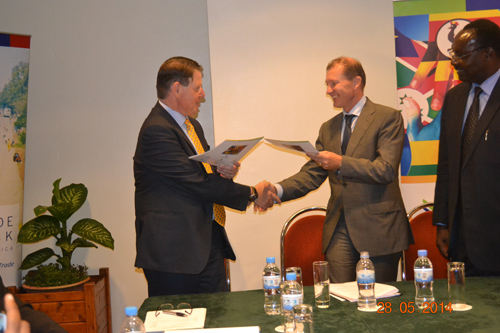TRADEMARK EAST AFRICA, BELGIUM GOVERNMENT INVEST IN RAISING RWANDA’S COMPETITIVENESS WITH EAC AND DRC
Kigali – May 28
As a landlocked country, one of Rwanda’s biggest challenges is its burgeoning trade deficit. One of the main opportunities to address this growing trade imbalance and diversify Rwanda’s export base is by facilitating cross-border trade between neighbouring countries. Recognizing this, officials from the Government of Belgium and the Government of the United Kingdom through DFID have extended a grant worth $1,000,000 (Euro 725,000) to TradeMark Africa ( TMA ) through a Contribution Agreement under the TradeMark Africa Rwanda Programme. The programme dubbed “Linking East to West – Supporting Rwanda’s Trade Competitiveness with the EAC and DRC” – will reduce the cost and increase the value of trade between Rwanda and the DRC.

The event occurred at the Hotel De Mille Collines in Kigali, Rwanda and included H.E Marc Pecsteen, Belgian Ambassador to Rwanda, Mr. Erwin De Wandel, Minister Counselor at the Embassy of Belgium in Rwanda, Mr. Frank Matsaert, Chief Executive Officer, TradeMark Africa (TMA) and Mr. Peter Cederblad, TradeMark Africa (TMA) Programme Investment Committee (PIC) chair. Also present, were members of the TradeMark Africa (TMA) PIC representing several donors including the government of Canada, Denmark, Finland, Netherlands, Sweden, UK and US, private sector and civil society. Implementing partners on this programme include Rwanda Ministry of Trade and Industry (MINICOM), Rwanda Development Board (RDB), ProFemmes/Twese Hamwe and International Alert.
The program is a 20 month, $1 million activity that will seek to reduce the cost and increase the value of trade between Rwanda and the DRC, enhancing the cross-border trade (CBT) environment, setting up a cross border market for informal traders that will focus on the high-potential DRC destination market and increase the competitiveness of Rwandan exports along this border and improve the capacity of Rwandan SMEs and traders to export.
Ambassador Marc PECSTEEN commended the Government’s initiatives for regional integration and trade facilitation measures between Rwanda and neighbouring countries, which will considerably contribute to enhance the trade environment in the Great Lakes region in view of strengthening peace and stability efforts in the region.
“Increasing cross-border trade is one of the main priorities to bridge Rwanda’s burgeoning trade deficit. The DRC border is a “border of opportunity” comprising $192m of formal and informal exports in 2013 from Rwanda. Through this programme, the proposed interventions will seek to increase both formal and informal exports to DRC, which will lead to a tangible impact on poverty and gender,” said Mr. De Wandel.
TradeMark Africa Chief Executive Officer Frank Matsaert noted that the high cost and time of crossing the border undermines trade and reduces demand for and supply of Rwandan products and services in cross-border markets. One key way to address this will be to work with a “Coalition of Change” including partners in government, the private sector and civil society to improve several aspects of the cross-border trade environment.
“The Belgium Government is an important partner in promoting regional and economic integration in East Africa. TradeMark Africa will continue to focus its efforts on increasing trade and prosperity in the region, primarily through investing where there will be the biggest impact for East Africa’s people and the private sector. Facilitating regional trade is an effective means to alleviate poverty. This investment in supporting these projects is the catalyst needed to bring prosperity to the region,” said Matsaert.
Cross Border trade is crucial for Rwanda. 37% of Rwanda’s merchandise exports in 2012 were exports to Rwanda’s four neighbouring countries – Burundi, DRC, Tanzania and Uganda. Cross-border trade, mainly informal, plays an important role in poverty reduction as it provides trading opportunities for many of poorest, particularly women, who are the most active traders along Rwanda’s borders.
Expected results from the programme include:
- A reduction in time and cost for goods/services to cross borders by 1 day from the current 41 days and $790 to formally export to the DRC.
- An increase of 25% in informal trade across the Rubavu/Goma market which could lead to an increase in exports via Rubavu of approximately $4.62m.
- Generating an increase of 30% increase in volumes of producers, especially producers mainstreamed into the RDB export development programme.
For more information contact :
Nelson Karanja,
Senior Communications Manager,
TradeMark Africa,
Tel: +254 20 4235106
Mobile: +254 722 678 844
Email: [email protected]
Edmond Murenzi
Program Assistant
Embassy of the Kingdom of Belgium in Kigali, Rwanda
Tel: +250252592318
Mobile: +250788838400
Email: [email protected]
Source: TradeMark Africa(TMA)
TradeMark Africa (TMA) is an aid-for-trade organisation that was established with the aim of growing prosperity in East Africa through increased trade. TradeMark Africa (TMA) operates on a not-for-profit basis and is funded by the development agencies of the following countries: Belgium, Canada, Denmark, Finland, the Netherlands, UK, and USA. TradeMark Africa (TMA) works closely with East African Community (EAC) institutions, national governments, the private sector and civil society organisations.















